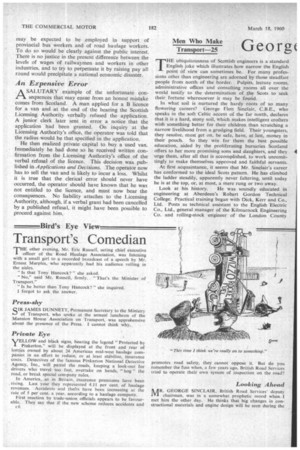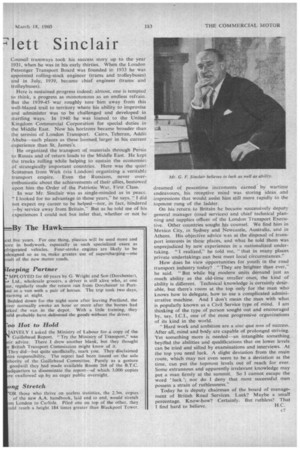Bird's Eye View
Page 42

Page 43

If you've noticed an error in this article please click here to report it so we can fix it.
Transport's Comedian
THE other evening, Mr. Eric Russell, acting chief executive officer of the Road Haulage Association, was listening with a small girl to a recorded broadcast of a speech by Mr. Ernest Marples, who apparently had his audience rolling in the aisles.
" Is that Tony Hancock?" she asked. "No," said Mr. Russell, firmly. "That's the Minister of Transport." "Is he better than Tony Hancock?" she inquired. I forgot to ask the answer.
Press-shy SIR JAMES DUNNETT, Permanent Secretary to the Ministry of Transport, who spoke at the annual luncheon of the Mansion House Association on Transport, was approhensive about the presence of the Press. I cannot think why.
Private Eye
VELLOW and black signs, bearing the legend "Protected by I Pinkerton," will be displayed at the front and rear of lorries owned by about 24 American mid-west haulage companies in an effort to reduce, or at least stabilize, insurance costs. Detectives of the famous Pinkerton National Detective Agency, Inc., will patrol the roads, keeping a look-out for drivers who travel too fast, overtake on bends, " hog " the road, or break special company rules. In America, as in Britain, insurance premiums have been ,rising. Last year they represented 4.11 per cent, of haulage revenues. Accidents arid thefts have been increasing at the l'ate of 5 per cent, a year, according to a haulage company. First reaction by trade-union officials appears to be favourable. They say that if the new scheme reduces accidents and c6 promotes road safety; they cannot oppose it. But do you remember the fuss when, a few years ago, British Road Services tried to operate their own system of inspection on the road?
Looking Ahead
R. GEORGE SINCLAIR, British Road Services' deputy al chairman, was in a somewhat prophetic mood when I met him the other day. He thinks that big changes in constructional materials and engine design will be seen during the
ext five years. For one thing, plastics will be used more and ore in bodywork, especially in such specialized cases as frigerated vehicles. Four-stroke engines are likely to be designed so as to, make greater use of supercharging—one -suit of the new motor roads.
leeping Partner
MPLOYED for 60 years by G. Wright and Son (Dorchester), Ltd., wholesale grocers, a driver is still alive who, at one me, regularly made the return run from Dorchester to Portnd in a van with a pair of horses. The trip took two days, turning at night.
Bedded down for-the night soon after leaving Portland, the ver normally awoke an hour or more after the horses had rked the van in the depot. With a little training, they uld probably have delivered the goods without the driver.
oo Hot to Hold
AIVELY I asked the Ministry of Labour for .a copy of the Guillebaud Report. Try the Ministry of Transport," was eir advice. There I drew another blank, but they thought e British Transport Commission might know of it.
They did—but quite unofficially, mark you. They disclaimed tire responsibility. The report had been issued on the sole thority of the Guillebaud Committee, Purely as a gesture goodwill they had made available Room 268 of the B.T.C. adquarters to disseminate the report—of which 3,000 copies re swallowed up by an eager public overnight.
ong Stretch
OR those who thrive on useless Statistics, the 2.3m. copies of the new A.A. handbook, laid end to end, would stretch )m London to Carlisle. Piled one on top of the other, they uld reach a height 184 times greater than Blackpool Tower.
























































































































